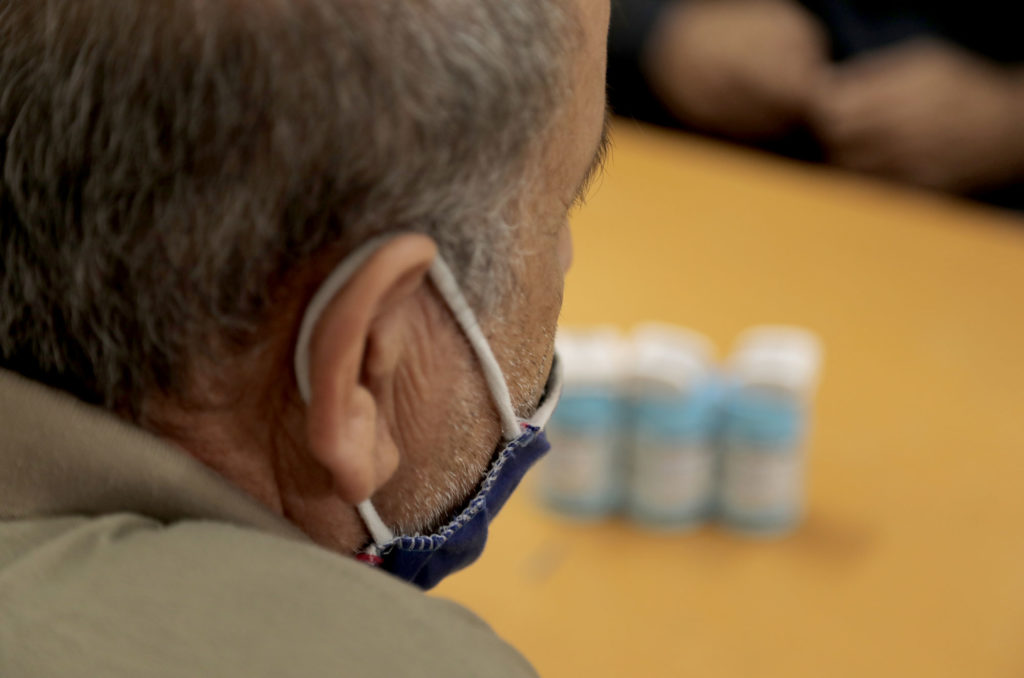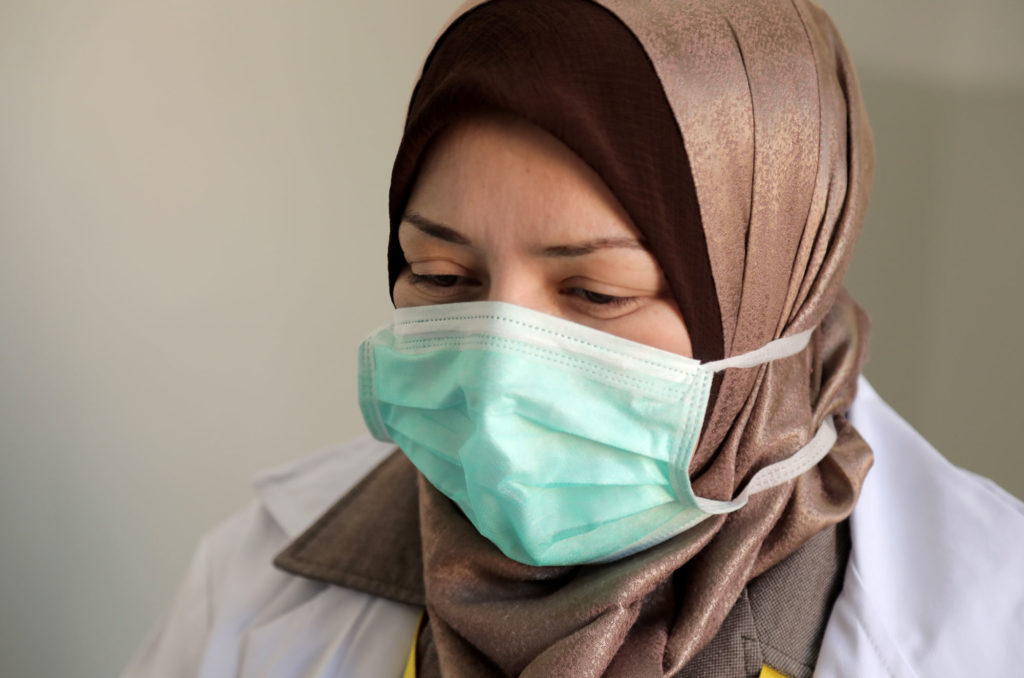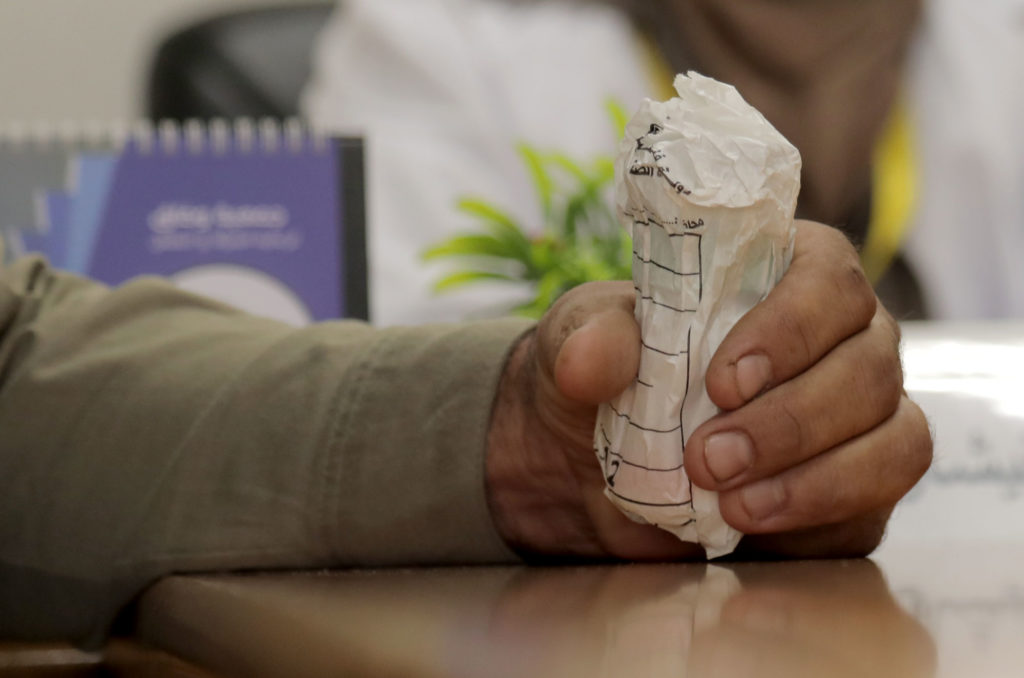HEALTH
Gaza’s Mental Health Patients Overcome Stigma and Shortages
Jan, 2021
Medical aid helps Palestinians with mental illness overcome the obstacles to get care
When he was 17, Khaled began experiencing the symptoms of schizophrenia. Ever since — four decades later — he has been coming to the psychiatric clinic at Shifa Hospital in Gaza for his medication and check-ins with staff.
His current medication is fluoxetine hydrochloride, which is used to treat a range of mental health disorders, including depression, obsessive-compulsive disorder and bulimia.
“I used to lose my temper,” he says. “But after having this medicine, I became better.”


“This medicine is absolutely the best one.”


Thanks to a generous medical donation from Americares, Anera recently distributed fluoxetine to Shifa Hospital, making the medication available to their patients at no charge. The hospital is using fluoxetine to treat patients suffering from depression, PTSD, and some cases of schizophrenia.


Shifa Hospital and community mental health centers in Gaza are seeing an increase in the number of new patients suffering from diseases like depression, schizophrenia and post-traumatic stress disorder. “The number of patients increases every week,” says Rose El Quishawi, a pharmacist at Shifa.
The reasons, she says, are not hard to find. She attributes the rise to “the psychological stressors facing individuals in Gaza, which are really difficult. That’s the major reason. Due to the difficult circumstances in Gaza, most people suffer from psychological symptoms.”
For related reasons, they are also seeing an increasing number of patients who cannot afford to buy their medications on the market.
Unfortunately, fluoxetine is rarely available in Gaza in large enough quantities to ensure patients like Khaled can complete a full course of treatment. Plus, it’s simply too expensive for many patients in Gaza. Khaled says,


“I tried to buy it, but it is always over my budget.”
If he had to buy the medicine from outside pharmacies, it would be a weekly cost of about the price of a basic lunch in the U.S. “This sounds like a small amount of money,” he says, “but it’s a lot to afford on a regular basis.”
When the medicine isn’t available at Shifa’s pharmacy or in the market, he has had to reduce his intake.
The doctors say that to remain stable, Khaled should take the medicine twice daily, but due to shortages, they give him only half of his recommended dosage.
El Quishawi confirms this. “There certainly is a shortage of medicine,” she says. “We sometimes have to give patients only half of the needed doses.”
“I became nervous and that lasted for quite a while. I had difficulty sleeping and was admitted to the hospital more than once. I could not control my actions and became violent.”


“Now that I am on this medicine, I am much better and they released me from the hospital.”
Khaled says, “We hope to always have the medicine available so that it’s there whenever we need it, because any delay causes a lot of stress.”
For the last decade Jomaa has struggled with his mental health. In 2011, he lost his son to liver disease. Despite the gravity of his illness, the boy was unable to get a permit to travel for treatment. “He fell into a coma that ended with his death, and I started dealing with this trauma,” Jomaa says.
It was around this time that Jomaa began feeling short of breath. There were times when he could scarcely breath. “I was nervous and exhausted. I could not sleep due to the wheezing.”
He went to the doctor and underwent a battery of tests over the next few years. It was only after five years passed, when he had excluded all physical explanations, that Jomaa discovered that the source of his symptoms was psychological. He says,




“It was difficult to admit that this wasn’t a physical disease.”
El Quishawi says that public awareness in Gaza about psychiatric illnesses and treatment options is very limited. Many are unaware that help may be available.
Further, there is “the stigma attached to mental illness. When people go to the clinic, they tend to look round to make sure that nobody is watching. In our society, mental illness is a disgrace.”
In 2016, Jomaa was transferred to the psychiatric clinic at Shifa Hospital. He was diagnosed with trauma and prescribed fluoxetine.
Even now, he gets winded climbing stairs and must take frequent breaks to catch his breath. He once worked construction in Israel but his health problems made that impossible. So he found work as a driver. But still finds it tiring so he’s only able to work for two or three hours a day.
Sometimes when fluoxetine isn’t available, he looks for alternatives. “I’ve found cheaper ones, but they are less effective.


“If I skip it for two or three days, I start getting shortness of breath and having trouble sleeping again.”
Thanks to Americares for making the fluoxetine available to patients like Khaled and Jomaa.
Sign up for emails from Anera!
Thanks to Americares, Anera was able to distribute this shipment of medicines to 13 clinics and hospitals. We delivered fluoxetine hydrochloride 20mg exclusively to Shifa Hospital as it is the sole qualified mental health treatment center in Gaza. The medication is often used to treat depression, and also sometimes obsessive compulsive disorder and bulimia.


